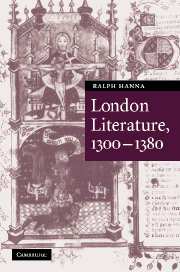Book contents
- Frontmatter
- Contents
- List of abbreviations
- In Thrall
- 1 English vernacular culture in London before 1380: the evidence
- 2 The ‘Old’ Law
- 3 Reading romance in London: The Auchinleck Manuscript and Laud misc. 622
- 4 Pepys 2498: Anglo-Norman audiences and London biblical texts
- 5 Anglo-Norman's imagined end
- 6 ‘Ledeþ hire to Londoun þere lawe is yshewed’: Piers Plowman B, London, 1377
- The end of early London literature
- Bibliography
- Index of manuscripts cited
- General index
- Cambridge Studies in Medieval Literature
2 - The ‘Old’ Law
Published online by Cambridge University Press: 22 September 2009
- Frontmatter
- Contents
- List of abbreviations
- In Thrall
- 1 English vernacular culture in London before 1380: the evidence
- 2 The ‘Old’ Law
- 3 Reading romance in London: The Auchinleck Manuscript and Laud misc. 622
- 4 Pepys 2498: Anglo-Norman audiences and London biblical texts
- 5 Anglo-Norman's imagined end
- 6 ‘Ledeþ hire to Londoun þere lawe is yshewed’: Piers Plowman B, London, 1377
- The end of early London literature
- Bibliography
- Index of manuscripts cited
- General index
- Cambridge Studies in Medieval Literature
Summary
Once, in an age more philologically concerned, ‘The Proclamation of 1258’ had a venerated, because originary, status. The text, a little inaccurately identified as the oldest surviving piece of London Middle English, remains of philological importance, and this the only guise under which it is published. But, whether originary or no, the proclamation repays scrutiny because of its characteristics as an early London document.
First of all, it is a legal document, not a literary text. In it, ‘Henri, þurჳ godes fultume king on Englene loande’, reassures a community of its rights, and in two languages, only one truly a vernacular, English and Anglo-Norman; Henry III promulgated this text, under duress, to hold off his rebellious barons (the ‘rædesmen’ whose power to legislate, exclusive of regal veto, the text acknowledges) after the Parliament of Oxford. As will appear, this is an important legal nexus. Two copies of the text survive: that normally printed, entered on the Patent Roll in the Public Record Office, in the form of an address to the sheriff of Huntingdonshire; and one surviving promulgated writ (English only), that sent to the sheriff of Oxford and to be preserved in the county muniments – as the document commands ‘to halden amanges ჳew ine hord’ (lines 20–2, 34–5).
Secondly, befitting a legal text, the proclamation, in both renditions, is written in legal script. This is a hand associated with the production of documents, rather than that customary for copying books in the thirteenth century, the formal littera gothica textualis.
- Type
- Chapter
- Information
- London Literature, 1300–1380 , pp. 44 - 103Publisher: Cambridge University PressPrint publication year: 2005



